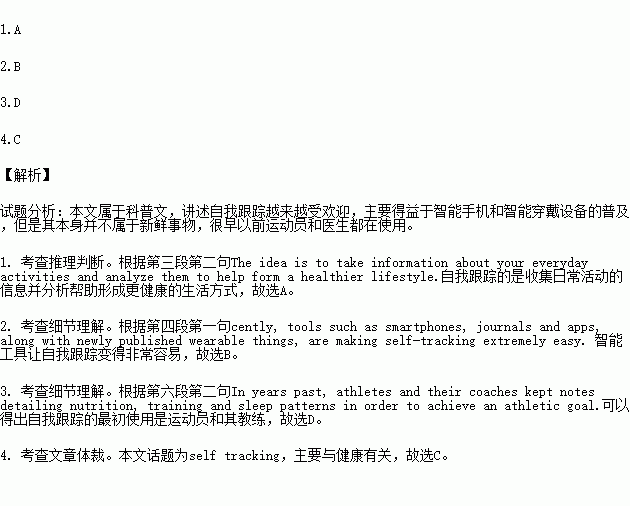题目内容
What Is Self-tracking All about
Have you ever monitored something about yourself? Perhaps you’ve tracked how many kilometers you’ve run, how many hours you’ve slept or how many calories you’ve eaten in a day.
If so, you’ve taken part in a movement called the “Quantified Self Movement.” Individuals gather information about their daily activities in this popular movement, also called self-tracking. This may sound difficult, but technology is making the process easier.
Perhaps you’ve wanted to change a bad habit but couldn’t. Self-tracking may be your answer. The idea is to take information about your everyday activities and analyze them to help form a healthier lifestyle.
Recently, tools such as smartphones, journals and apps, along with newly published wearable things, are making self-tracking extremely easy. Today, one can use Fitbit, the Jawbone Up, Google Glass or a smart watch to record personal data including sleeping hours, stress levels, heart rate and mood.
So why does a person self-track? Someone may be trying to lose weight or improve their sleep patterns. Another person feels tired after eating. Self-tracking could help him to know what foods make him sleepy and watch his diet.
Monitoring daily activities isn’t a new concept. In years past, athletes and their coaches kept notes detailing nutrition, training and sleep patterns in order to achieve an athletic goal. Similarly, doctors have also helped patients to record parts of their lifestyles and eating habits to help fight allergies, headaches and other health problems. However, it wasn’t until 2007 that magazine editors Gary Wolf and Kim Kelly, who started tracking every move they made, coined the term “Quantified Self.” Wolf says that the new tools will change our sense of self with the purpose of making us more effective in the world.
Although self-tracking has many advantages, Dennis Nash, president of Data Speaks Health Solutions, says self-tracking has its drawbacks. Once people start tracking their daily activities, it can become an addition people like to do often. Also, they might begin to worry too much about their health.
While self-tracking doesn’t guarantee that one’s quality of life will improve, it can highlight the importance of eating well and exercising daily. After all, the Quantified Self Movement’s focus is motivating people to apply enough energy to make healthier choices.
1.People choose self-tracking because _______.
A. it collects personal data and leads to self-improvements
B. it records how many hours you sleep a day
C. it watches your eating habits
D. it increases your movement
2.The writer mentions tools such as smartphones and apps in Paragraph 4 to show _______.
A. we depend too much on them
B. it is easier to do self-tracking
C. they do harm to people’s health
D. equipment is necessary to do self-tracking
3.Self-tracking was firstly put forward by _______.
A. scientists of Data Speaks Health Solutions
B. athletes and their coaches
C. doctors and their patients
D. two magazine editors
4.You can find this article in the part of _______.
A. Education B. Entertainment C. Health D. News
 每日10分钟口算心算速算天天练系列答案
每日10分钟口算心算速算天天练系列答案
